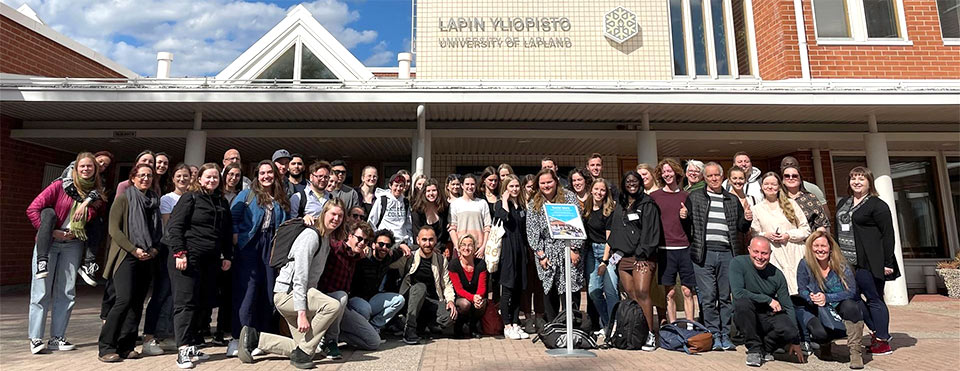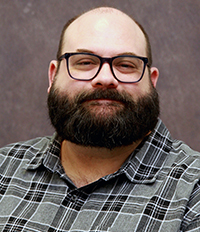University of Vermont: Small Program With Big Plans

University of Vermont in Burlington: home of an ambitious social work department
For a relatively small social work education program, the University of Vermont (UVM) Department of Social Work certainly has a lot going on.

First of all, it’s been growing lately, having recently added two new faculty members with more on the way, says department Chair Jan Fook, PhD, FAcSS (pictured at right, delivering a lecture upon receiving a University Scholar's award in 2022).
At the same time, the department is working to sharpen its international focus. Fook, whose experience as an academic includes work in Australia (her birthplace), Canada, Norway, the U.K. and the U.S., wants to instill in the curricula such perspectives as comparative analysis of the diverse approaches to social work education in different countries.
Global Outreach
As part of this international push, Fook already has been working with incoming BSW Program Coordinator Danielle Jatlow, MSW—who takes on her new role this fall—on “a set of guiding principles that will offer students a thoughtful, intentional, well-honed approach to what social work theory, practice, policy and research looks like and feels like on a global level,” says Jatlow.
Fook also would like to partner with universities in other countries to offer more study-abroad programs. Recently arrived associate professor and MSW Program Coordinator Dr. Kelly Melekis was previously Skidmore College’s Social Work Department chair and a 2022 Fulbright Scholar. Through her scholarship, Melekis developed ties to social work educators in Lithuania and is looking to set up virtual sessions for Lithuanian and UVM students to share ideas.

Pictured above: Students from numerous countries attend the UVM-University of Lapland international summer school in Rovaniemi, Finland, organized by Dr. Kelly Melekis (kneeling at far right).
In addition, Melekis organizes an international summer school, this year involving UVM and partner University of Lapland in Rovaniemi, Finland. It draws lecturers and students from as many as 10 different countries, such as Austria, Germany, Nigeria, the U.K. and the U.S., to learn about one another’s social work practices.
Another faculty member with international connections is assistant professor Dr. Siddhesh Mukerji, who researches Buddhist social activism in India and plans to develop partnerships in that country. And joining the department this fall will be associate professor Dr. Simon Chan, who brings 17 years of academic experience from Hong Kong.
Other Initiatives

On another front, Melekis brings to UVM a strong background in gerontology as a practitioner, lecturer and researcher. A lot of her work, she says, has been with older adults who are marginalized, whether homeless or facing abuse and neglect, mental health, substance use or other such issues.
Pictured at right: Students and faculty at a celebration for BSW seniors.
Melekis’ goal is to expand the elder care workforce. Some social work students, she says, have been involved in projects like “Vermont Bridges,” which trains health care professionals in dementia care and is housed in UVM’s College of Medicine.
Also focusing on mental health is associate professor Dr. Jennifer M. Putney, who previously served as the principal investigator of several federally funded training grants supporting workforce development in behavioral health and substance use prevention, treatment and recovery services in underserved areas.
She brings her knowledge and experience as a clinical social worker, educator and researcher to UVM to teach courses in mental health assessment, substance use and research. She is working to develop interdisciplinary collaborations across the university to address the shortage of health care providers trained in substance use care. In her teaching and research, Putney’s particular area of interest is the intersection of substance use and social justice.

Another effort in the mental health area is the federal Health Resources and Services Administration-funded VT-TREE (Vermont Trauma, Resiliency, and Equity Education) initiative, housed in the College of Medicine.
It aims to provide trauma-informed and resiliency-based training for MSW and MS (counseling) students from a number of underserved and underrepresented communities, says social work assistant professor Dr. Christine Marie Velez, who is a co-principal investigator.
This fall the program will offer six online workshops on such topics as substance use, historical trauma, and climate change grief and trauma.
Pictured above: BSW students engage with local youth as part of a service-learning course
Underpinning the UVM Social Work Department’s entire structure and methodology is an emphasis on “transformative social work,” says Fook. “By this we mean pretty radical political change, as in social justice and social equity. Academically it means we subscribe to certain theories, such as critical social constructionism.”
One related project: Some UVM social work faculty have been involved in a new book to be published by Columbia University Press called “Academic Practice in Transformative Social Work,” which includes international contributions.
Eastern Washington University: Helping Students Help Their State

Dr. Amanda Reedy, professor, chair and director of the School of Social Work, talks about her school’s student body makeup, hybrid MSW option, Ballmer behavioral health scholarship and new library practicum placement.
What is the composition of the social work program’s student body?
We serve a lot of first-generation college students in both the BSW and MSW programs, as well as many students from the more rural and agricultural areas, mainly on the east side of the state. Students often want to go back to serve their home communities. Around 30 percent of our BSW students are Hispanic.
What would you say is particularly unusual about your school?
We have the traditional full-time BSW and MSW programs, but we also have two part-time MSW programs. One is in Everett, serving the population on the west side of the state, and the other is here in Spokane. Both allow students to finish in three years, instead of two, and both are hybrid programs.
Could you describe the school’s involvement with the Ballmer scholarship?
It’s a collaboration among several schools in the state and involves a conditional grant for master’s students committed to working in community behavioral health. If they complete their practicum in a community behavioral health agency or a tribal agency, students get their tuition funded in exchange for a commitment of about three years of service in a community behavioral health or tribal agency in the state after graduation.
Any other interesting initiatives?
We have a new practicum partnership with the Spokane Public Library, whereby we are able to place some social work students there and offer case management services to community members in need who may be coming through the library.
Kent State University: The ABCs of Launching a BSW Program

“For many years, state agencies, nonprofit agencies, people in the behavioral health sector, in public health had been knocking down the doors of Kent State, saying, ‘We have a real need for qualified, well-educated social workers,’” says BSW Program Director Matt Butler (pictured left), based at the university’s Ashtabula, Ohio, campus.
The main issue has been rural poverty, where in Ohio and many other states, dwindling populations have led to dwindling resources and burgeoning despair, alcoholism and drug misuse, adds Butler, who calls it the “opiate apocalypse.”
Enter the BSW program at Kent State. In process for nearly four years, approval involved Kent State’s Educational Policies Council, Faculty Senate, and various faculty and staff, followed by different state entities. Meanwhile, curriculum proposals were reviewed by the Kent State provost’s office and ultimately the board of trustees. Butler, who had been a program consultant, officially took his new position Jan. 9. The last part of this initial phase is hiring a field director, now in the works.

The hybrid program, says Butler, will launch this fall on three “pretty geographically spread-out” Kent State regional campuses in northeastern Ohio—Ashtabula, Tuscarawas and Salem. As the student body expands so will the faculty, but initially Butler and the new field director will split their time between the three campuses.
Pictured at right: Kent State's Ashtabula campus: ground zero for the BSW program.
“I see a lot of gaps [in client care], having been out in the community trying to hire people to do these jobs,” says longtime practitioner Butler. “And I’m really thrilled to have a chance to be on the other end of it and help educate folks to fill in the holes.”